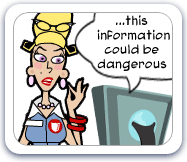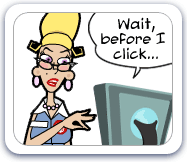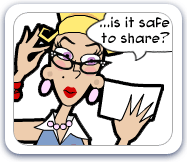Shortcuts:.
Back to Cyberspace Communications
What IS personal information and Why Is It Dangerous?
To Share or Not to Share - your Personal Information Filter
More Cyberspace Communications Topics:

Importance of Being Anonymous
Betty's blog archives.
Hint Sheet:.
Protecting your Information | Communicating Safely | Managing your Online Identity
In order to communicate safely in cyberspace, you need to protect yourself and your personal information. But what exactly is it and why must you protect it?
What IS Personal Information and Why Is It Dangerous?

Personal information is any information that can be used to identify you or find out where you are. This includes obvious things like your full name and address, and some less-obvious things like your car's license plate number or what sport you play at school.
Cyber criminals and sneaky weirdo strangers will use everything they know about you to trick and harm you. Knowing your personal information just makes it that much easier. They might try to find out where you live and break into your house, or try to steal your identity or your money. They might even lie to you about how old they are and try to get you to meet with them in person to hurt or even kidnap you.
Cyber criminals can be very patient when trying to discover your offline identity. They'll casually slip it into conversation, hoping that you won't notice. They remember everything you tell them and might stick around for a long time trying to get you to slip up and reveal something.
The more personal information you reveal in cyberspace, the more in danger you are putting yourself and your family in. You must always be on your guard, cyber defenders! Even the littlest things that seem so harmless can be dangerous to share over time. You can refer to Hint Sheet #2 from the Personal Information Training Mission for a list of examples of personal information.
To Share or Not to Share - Your Personal Information Filter

For the most part, you can control the information you share in cyberspace. You make a judgment call every time you click a button to post or send something, deciding if what you’re sharing is safe and appropriate.
Sometimes this can be a really hard decision to make, so it helps to have a Personal Information Filter, a list of questions to ask yourself before posting something:
- Can this information be used to locate or identify me offline?
- Can this information make it easier for someone to cyberbully me, hack my accounts or steal my identity?
- Would I want this information to show up in a search engine's results for my name?
- Is this something I wouldn't want my grandmother or teacher to see?
- Is this information that someone could use against me in some way?
- Is this information that only a few people should know?
- Is this information that would help someone guess my password?
- Would this information give someone the wrong impression about me?
- Is it going to be a problem if I can't take this information back?
If the answer is NO to every question, the information is probably safe to share online. You can work with a trusted adult to come up with your own list of questions. If you still have doubts about something, even if it has passed your filter, it's safest just to keep it offline.
This goes for photos and videos as well. A photo of you at soccer practice could help a cyber criminal figure out where you'll be after school. A picture of your front yard could reveal your house's address or your car's license plate number. Before you post, check each photo thoroughly, blur out or alter any risky parts, and don't post anything that reveals personal information.
What IS Safe to Share?

With all this information that is not safe to share online, you might be wondering if there anything left that is safe to share. Sometimes it's just a matter of not telling the whole story. For example:
- Share your favorite band, but not which concert you have tickets for
- Share your pet's name, but not which park you take him to
- Share your favorite food, but not which restaurant you go to all the time
- Share what sports you play, but not what team you play for
- Share which books you have read, but not which library is near your house
- Share your opinion, but not if it's going to hurt someone's feelings or offend someone
- Share a funny picture of a squirrel, but not a picture of you acting squirrelly
These can give your online friends an idea of what your likes and dislikes are and who you are as a person without giving away any of your personal information or your offline identity.
Protecting Your Information | Communicating Safely | Managing your Online Identity
